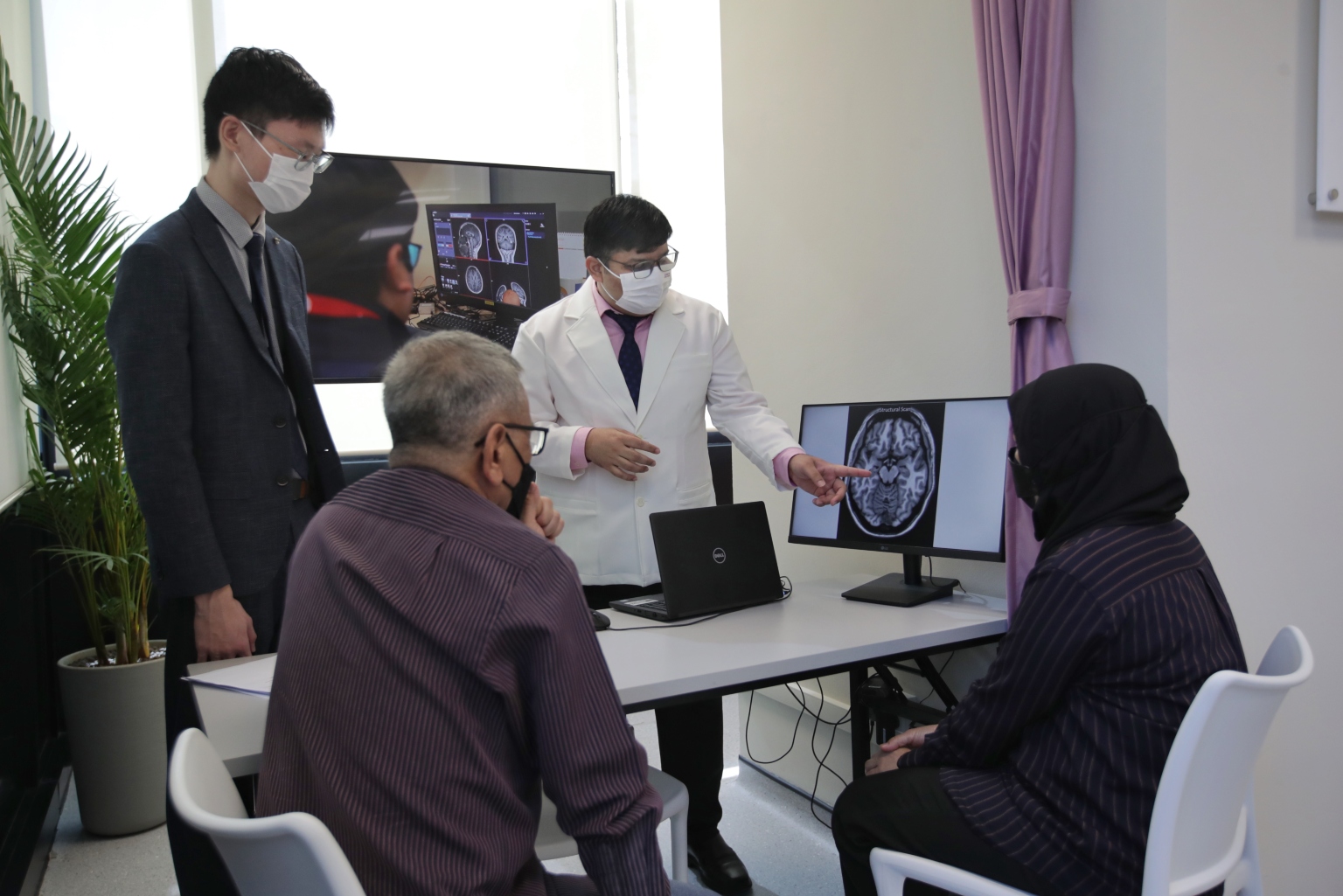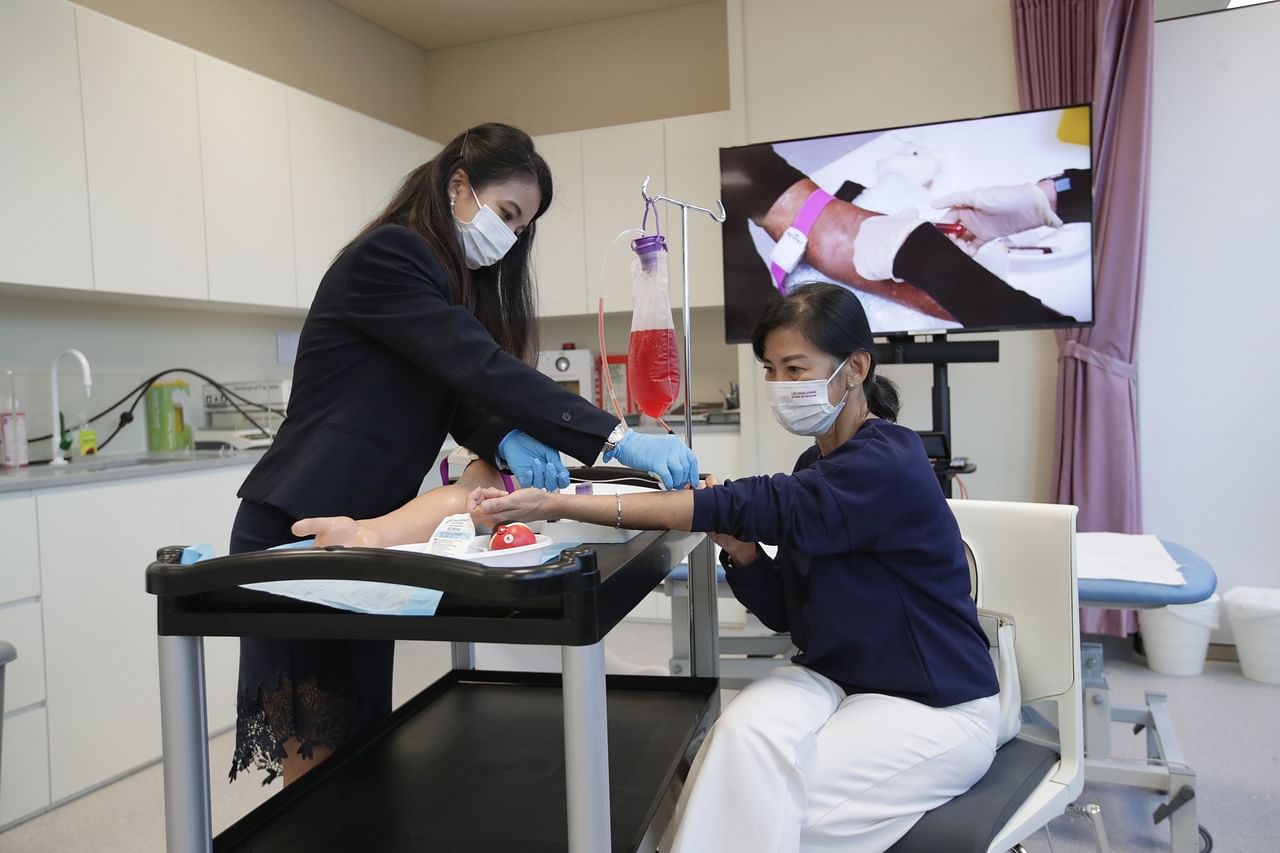NTU launches centre to study how dementia develops in Asians
Sign up now: Get ST's newsletters delivered to your inbox

Research associate Dilip Kumar (second from right) explaining the process of an MRI scan to participants on April 25, 2022.
ST PHOTO: GIN TAY
SINGAPORE - The Lee Kong Chian School of Medicine at Nanyang Technological University has launched a centre to study the changes in the brains of Asians before dementia sets in as well as find new strategies that can one day predict and delay the progression of the syndrome.
It is thus targeting people with suspected cognitive decline or mild cognitive impairment (MCI).
Singapore's director of medical services Kenneth Mak, the guest of honour at the launch of the Dementia Research Centre (Singapore), or DRCS, said in his speech that the centre aims to develop and validate novel biomarkers and new interventions for dementia in the Asian population.
In Singapore, one in 10 people aged 60 and above lives with the condition.
Associate Professor Mak also said the Ministry of Health adopts a multipronged approach to dementia care, which includes raising awareness of it, enhancing care capacity and capability in the community and hospitals, and supporting caregivers of people living with dementia.
Most of the patients here who have sought help are those with moderate to severe dementia.
Associate Professor Nagaendran Kandiah, director of the DRCS, said: "The challenge with treating dementia is that if it is not picked up early, you miss the boat. Once you lose brain cells, there is nothing we can do to reverse that."
He said that changes in the brain can occur as early as 30 years before one develops dementia, and about 80 per cent of the people with mild cognitive impairment - estimated at 250,000 people - will go on to develop dementia.
For this group, their risk of getting dementia rises by 10 per cent to 15 per cent every year.
"If you are able to diagnose people at this stage, then you will be in a better position to help them prevent dementia," he said.
Crucially, the centre aims to shed light on "Asian dementia" because of the biological factors unique to the Asian brain that increase the prevalence of dementia.
For instance, Asian patients are three times more likely than Caucasian patients to suffer from cerebral small vessel disease, which is a narrowing of the small blood vessels in the brain that then appear as white matter lesions. They can put one at increased risk of dementia and more rapid cognitive decline.
About 80 per cent of the patients at dementia clinics in Asia have white matter lesions.
Prof Kandiah also said that the prevalence of the APOE4 gene and the amyloid-beta gene, which are associated with Alzheimer's disease, is much lower in Asian patients, though in many international trials, the APOE4 gene is an inclusion criterion.

Research associate Dilip Kumar (second from right) explaining the process of an MRI scan to participants on April 25, 2022.
ST PHOTO: GIN TAY
Research done by the DRCS has shown that in Asians, small vessel disease results in more brain shrinkage among those who do not have the APOE4 gene, which shows that novel strategies may be needed to manage Asian patients with dementia, he said.
Furthermore, one in three Asian patients has the tau protein in his brain, which is known to be a risk factor for dementia, but no evidence of any amyloid-beta protein.
Prof Kandiah, who was previously with the National Neuroscience Institute, said the dementia research centre has already recruited 67 out of 1,500 patients targeted for a five-year study. One of them is his patient, Ms Lena Wong, who is nearing 70 and keen to learn more about her mild cognitive impairment and contribute to the efforts to delay the onset of dementia in people like her.
Her forgetfulness became obvious to her more than a decade ago, but the doctor she saw told her that she had "normal signs of ageing". A few years ago, it reached a point when she would go shopping, pay and then leave without her groceries.
It "happened again and again", which prompted her to see a geriatrician and then Prof Kandiah.
At the research centre, participants will go through a cognitive assessment that will include state-of the-art blood tests to find brain proteins, specifically amyloid and tau, as well as a brain scan to look for brain shrinkage and the presence of white matter lesions. They will receive a free report eight weeks after their visit, which they can use for a discussion with their doctors.


